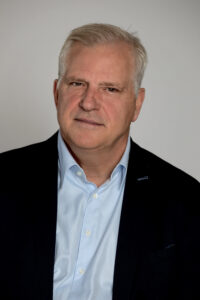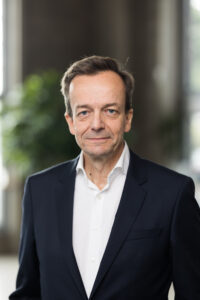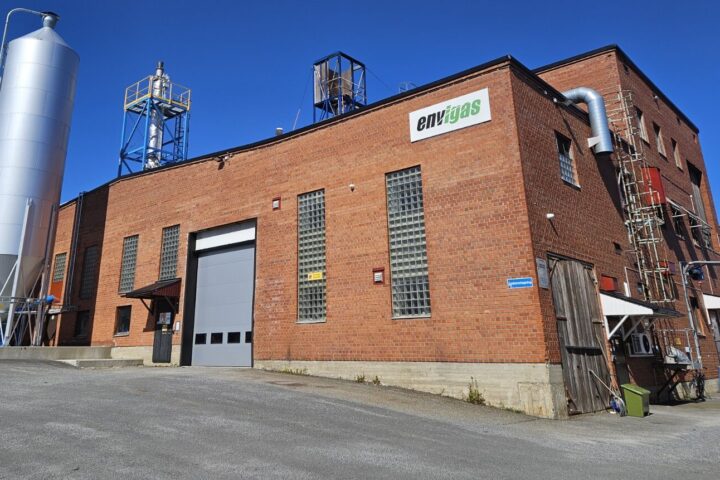Nothing was happening, but suddenly the flood gates opened. Swedish hydrogen companies and their major investments are on everyone’s lips. Access to clean energy, extensive knowledge around materials and an exploding demand have made Swedish hydrogen a red-hot arena.
He has a broad smile on his face as he grabs hold of the shovel, thrusts it into the ground and unearths a big lump of gravel. But it’s not surprising he’s happy, because Claes Fredriksson, CEO, and founder of Swedish Liquid Wind, has fought for many years to turn the first sod in this field.

Photo: Liquid Wind
His company is one of those crowding the growing Swedish hydrogen scene. Although hydrogen is nothing new, innovative applications and the fact that it is now possible to manufacture green hydrogen at scale have kicked off a veritable boom.
– It’s marvellous that hydrogen has finally taken its place on the agenda, says Björn Aronsson, operations manager at Vätgas Sweden, a trade organization that organizes more than 160 companies.
– Hydrogen has always had potential, but with the new climate goals and the new solutions these need, it has at last begun to assume the role in society it deserves.
Everything really took off in Sweden about five years ago, when heavy industry championed hydrogen as part of the solution to making fossil-free steel. Since then, things have escalated across all sectors of society.
– Today, many companies have brought commercial solutions to the market, and many more are queuing up to do so. It is the combination of a clean energy mix and exceptional material knowledge that makes Sweden an especially interesting hydrogen market for investors, Björn Aronsson explains.
Plagazi is one of these hydrogen companies at the very forefront in Sweden. While many others utilize electrolysis as the backbone of their processes, Plagazi creates hydrogen in a plasma gasification furnace using an unusual raw material: industrial waste unsuitable for recycling.

Torsten Granberg, CEO at Plagazi
– Today this waste, for example, worn-out turbine blades from wind farms, is incinerated or ends up in a landfill, observes Torsten Granberg, CEO and founder of Plagazi.
– This means that our process not only produces hydrogen to replace fossil fuels but also transforms a waste problem into a clean energy source.
The process Plagazi uses is based on a technology called plasma gasification, waste in the oven is broken down to the atomic level forming an extremely pure gas which is then transformed into hydrogen and carbon dioxide. The carbon dioxide is converted into its liquid form for final disposal and storage while the hydrogen gas is put on the market.
– This process was developed with the help of the Royal Institute of Technology in Stockholm in the mid-2000s. I had worked in the gas industry all my life and was invited to join the team, says Torsten Granberg.
Even at that time, he understood the value of the process while the rest of the world did not.
– The market wasn’t quite ripe for hydrogen then, but now things have really taken off, he observes.
Plagazi has now submitted an environmental permit application for its first large facility to be located in Köping, Sweden. Simultaneously the ground is being laid for further projects in Switzerland and Germany.
– Our process is less energy-demanding than those relying on electrolysis, which means that we can also build facilities in areas where energy is more expensive. You might say our techniques complement each other; Torsten Granberg observes.
Plagazi’s customers are primarily to be found in industrial processes and land-based transport. But hydrogen is not only interesting on land, it can also play an important role in shipping, especially when it has been refined a further step, into electro-methanol. And it was for a facility like this, FlagshipONE, projected as Europe’s largest, that in Spring 2023 Claes Fredriksson turned the sod in Örnsköldsvik.

Claes Fredriksson, CEO and Founder, Liquid Wind
– In our process, we capture biogenic carbon dioxide from, for example, a cogeneration plant, and with the help of electricity we combine this with hydrogen to obtain electro-methanol, a so-called electro fuel, Claes Fredriksson explains.
– The idea has been around for a hundred years, but it is only now that it has become commercially viable because we have mastered the technology that can do this effectively at scale.
Something that is of special interest to shipping companies. Today 99 per cent of the fuels used by the shipping industry are based on fossils, but a widespread changeover is just around the corner.
– Major container shipping companies are at the forefront of this transformation because they realize that in the near future, they will be restricted to using climate-neutral fuels. Today they are ordering ships that can run on methanol, they weren’t doing that two years ago.
Liquid Wind’s contribution to this revolution is not to manufacture the fuel itself but to lay the ground and develop production facilities. Liquid Wind’s plants use biogenic carbon dioxide from, for example, cogeneration plants and pulp mills – i.e., industries that generate a surplus of biogenic carbon dioxide thus enabling them to access another source of income.
And now the ground has been broken for the first full-scale plant, sold to the Danish energy company Ørsted, while Liquid Wind, together with various partners, is exploring the possibility of establishing comparable facilities elsewhere.
– We have several projects underway that appear very promising, but the breaking of the sod for the first full-scale facility means a lot. And of course, it is especially exciting that a large, well-known, international renewable energy company has chosen to invest in electro fuel “made in Sweden”.
The facility has also excited a lot of attention, Claes Fredriksson has met with the ministers for energy, the environment and infrastructure and believes the prospect of producing electro fuel locally will put Sweden on the map.
– We are doing the right thing at the right time with the right partners in the right country. Now we must prove that we can do it even faster, even cheaper, and then we will show the rest of the world what we have been able to do. Things are coming together in a very positive way right now!
Text: Karin Aase


